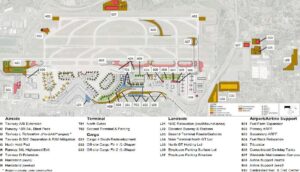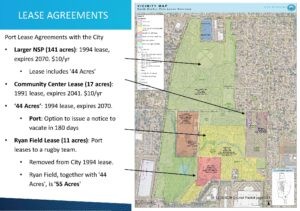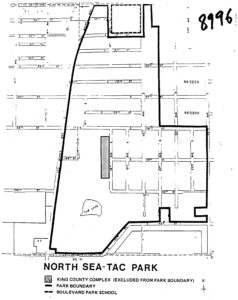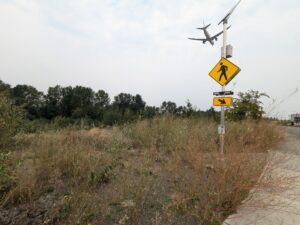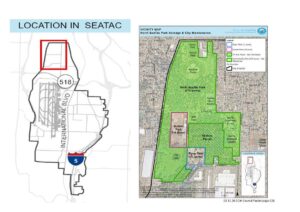Four hours, 700 pages Meeting Agenda It is difficult to get a man to understand something, when his salary depends on his not understanding it. Sustainable Airport Master Plan Draft EA Presentation (Item #11a SAMP EA Presentation) Sarah Potter: Landrum & Brown, Steve Rybold and Sarah Cox: Port of Seattle Today’s Commission meeting was
SAMP NTP Comment Process
31 projects in 45 days? The SAMP Draft EA documents are now available here: The Sustainable Airport Master Plan Near Term Projects (SAMP NTP) is a collection of 31 construction projects that will increase flights over the next decade by as much as a new runway, but without building a new runway. The environmental review
Port of Seattle votes on Q3 2025 timetable for North Sea-Tac Park
Language of order still leaves ultimate ownership uncertain At the Tuesday, October 8 noon meeting of the Port of Seattle Commission, the Commission voted to approve an amended version of Order 2012: Amended Order #2024-12 (sub) The amended version, created by Felleman and Mohamed, does not make any firm decision. Instead, it directs Port staff
Port of Seattle to vote to permanently restrict North Sea-Tac Park for recreational use
However, language of order leaves ultimate ownership uncertain At the Tuesday, October 8 meeting of the Port of Seattle Commission (Sea-Tac Airport Mezzanine 12:00pm), the following Order will be discussed and voted on: “The Port Commission hereby directs the Executive Director to undertake the Port activities necessary to meet the requirements described in Section 706
Port of Seattle Commission Agenda & Other Notables (October 4, 2024)
October 4, 2024 PORT COMMISSION AGENDA & OTHER NOTABLES Welcome to this 112th edition of Port Commission Agenda & Other Notables. We’ll be updating you on upcoming Port Commission agenda items that may of interest to Airport cities, as well as other timely, notable Port activities and opportunities. We initiated this as part of our
City Council approves Des Moines Creek West purchase from Port
At their September 26, 2024 meeting, the Des Moines City Council voted 7-0 to complete the sale of Tract C in exchange for $690,000 a connecting road between the existing complex and the expansion. An amendment to the sale was made by Councilmember JC Harris setting aside 10% ($69,000) of the proceeds towards a City airport
City Council to decide on Des Moines Creek West purchase from Port
Small parcel big step to enable controversial expansion of business park [09/19/2024]The City Council has added this item to their September 26 Agenda (6:00pm). [09/12/2024]At their September 12 meeting, the City Council held over this decision until October. We will provide notice as soon as it is scheduled. Please note that this sale is not
SR-509 Surplus, a tale of two cities
Background information on SR-509 WSDOT Surplus purchases by SeaTac and Des Moines along the 18th Ave Corridor For decades WSDOT owned surplus property along a corridor roughly parallel to 18th Ave., from 194th St. in SeaTac south through Des Moines as part of a previous plan for SR-509. The final (very different) alignment for SR-509
‘Elevated’ from Port of Seattle episode #4 (The Third Runway)
The Port of Seattle has launched a series of short films called ‘Elevated’ celebrating the 75th anniversary of Sea-Tac Airport. We think they are all worth watching, but this one, on the Third Runway, especially as it gives ‘their side of the story’. We object to almost every aspect of this video. Much of it
SeaTac City Council Special Meeting: the future of North Sea-Tac Park
55 or 200 Acres? There’s a lot more to this story The SeaTac City Council held a ninety minute Special Meeting (Agenda/Presentation) to discuss various options in purchasing the area known as North SeaTac Park, which is now (mostly) owned by the Port of Seattle. As Councilmember Peter Kwon mentioned at the beginning of the
